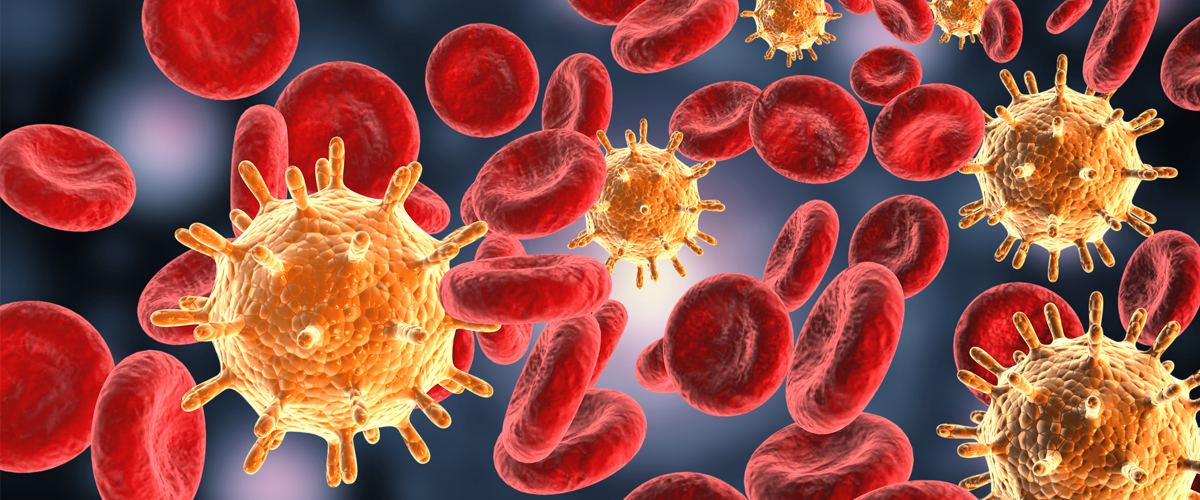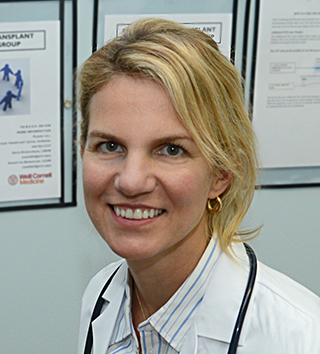A Three-Dose Vaccine Protects People Living with HIV Against Hepatitis B, Ongoing Clinical Study Finds
People living with HIV in the U.S., South Africa, and Thailand were completely protected from hepatitis B infection after receiving the third dose.

Illustration of a virus in the blood stream
A three-dose vaccine protected 68 people living with HIV against the hepatitis B virus, or HBV, an ongoing National Institute of Allergy and Infectious Diseases clinical study found.
“After the third dose of the vaccine, 100% of participants developed antibody levels known to provide protection from acquiring HBV, a liver infection that affects 10% of people living with HIV in the U.S.,” says Dr. Kristen Marks, an infectious diseases specialist at NewYork-Presbyterian/Weill Cornell Medical Center, who serves as one of two chairs of the clinical study.
HIV, a virus that attacks the body’s immune system, and HBV, a virus that causes a serious liver infection, are both spread from person to person in similar ways, through contact with semen, blood, or other body fluids of another person living with the viruses. The main risk factors for contracting both viruses are the same, including sexual contact or injection drug use, according to HIVinfo, an online resource of the U.S. Department of Health and Human Services that is maintained by the National Institutes of Health.

Dr. Kristen Marks
“Over time, HBV puts people at risk for developing liver disease including liver failure or liver cancer, which is why it is important to prevent and treat it,” says Dr. Marks, who is also an associate professor of medicine in the Division of Infectious Diseases at Weill Cornell Medicine. “In different studies over the years, the HBV vaccine response rate in people living with HIV was somewhere between around 35% and 70% with conventional HBV vaccines,” says Dr. Marks. “We studied this vaccine, which uses a novel way to boost the immune response to hepatitis B protein in hopes of doing better.”
In the clinical study, which is sponsored by the National Institute of Allergy and Infectious Diseases, 68 people who live with HIV in the U.S., South Africa, and Thailand were given three doses of the vaccine, called HEPLISAV-B, in the span of six months. The participants had not previously received HBV vaccination or showed past indication of the virus. “After the third dose, they had higher antibody levels than after the second dose,” says Dr. Marks. “Higher antibody levels are thought to be associated with longer protection from HBV, but we are still studying the duration of protection.”
Participants showed 94.4% protection from HBV eight weeks after receiving the second dose of the vaccine. And at week 24, before the third dose, it increased to 98.5%. This is similar to the response to two doses seen in studies of HEPLISAV-B in people without HIV.
In 2017, the Food and Drug Administration approved HEPLISAV-B as a two-dose regimen for adults. But according to Dr. Marks, little was known about the extent that the vaccine protected people who live with HIV. “Until now, HEPLISAV-B had not been studied in a prospective, rigorous fashion in people living with HIV.”
But the data from the present clinical study, which is set to conclude in March 2023, helps to change that. “The results provide evidence that the vaccine, whether administered in two or three doses, is safe and effective for providing people living with HIV with immune protection from hepatitis B infection,” says Dr. Marks.
Kristen Marks, M.D., is an infectious diseases specialist at NewYork-Presbyterian/Weill Cornell Medical Center and an associate professor of medicine at Weill Cornell Medicine. She is also the co-director of the Cornell HIV/AIDS Clinical Trials Unit, where she conducts several treatment studies related to HIV and hepatitis viruses. Her current research focuses on improving treatment outcomes in patients with HIV and hepatitis virus co-infections.
Additional Resources
Learn more about the Center for Special Studies (HIV/AIDS) and the Cornell Clinical Trials Unit.
